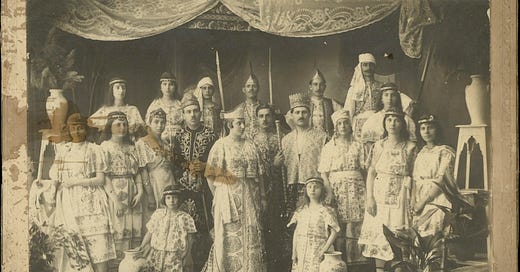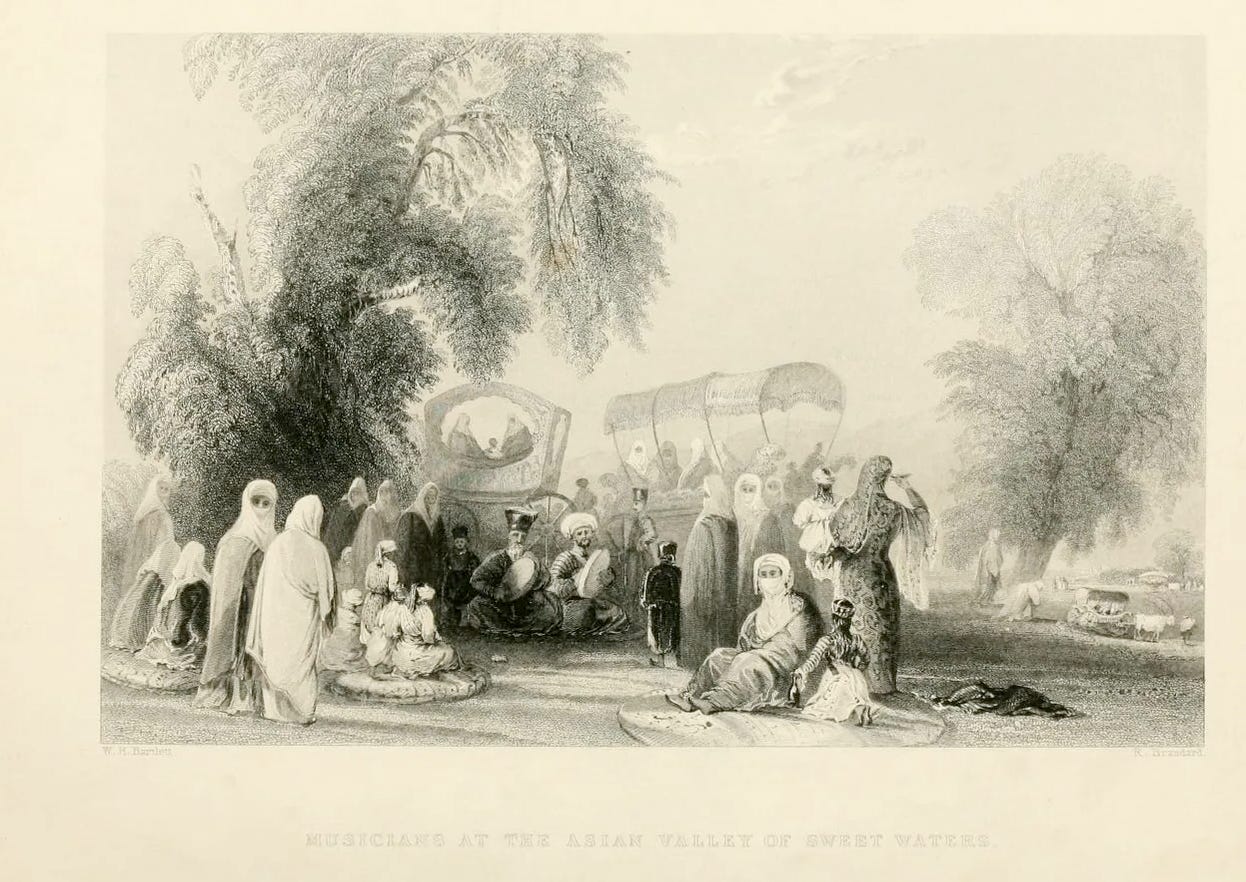Every now and then I have to remind myself that the Mississippi Sheiks actually happened.
Huh?
That despite all my romanticism, despite all the postmodern critiques that Nothing is Real, despite the accusations of Orientalism, despite all of it- the Mississippi Sheiks are not, in the end, a figment of my imagination. Nor is Naftule Brandwein or Lydia Mendoza or Sol Hoopi. Somewhere in the middle of an inconceivably cold and vast universe, the Mississippi Sheiks actually happened.
This doesn’t mean that the conditions they suffered under didn’t matter, or that the beauty of their music proves that they belonged in those conditions. It doesn’t mean I want to go back there. But the more the years go by, the more their music gets even weirder and more dreamlike. How is it possible people were once capable of this? How is it possible people were able to make this music outside of university grants and folklore festivals?
The charge of Orientalism is also real (“sheiks” after all- a coincidence, but maybe not?) and will be addressed in later posts. In the meantime, here are some perfume-scented, absolutely reckless moments of sheer romanticism that, as far as I know, actually happened.
By the way, if you’re ever in need of Psychic Courtyardism©, and who isn’t, it can be summoned anywhere and anytime by repeating the PsyCo© initiation vow: “[Insert your choice here] actually happened.”
Floating Fiddlers
"Every Saturday, on the small island in the lake, the Jews organized fiestas and called on Christian [Roma? see below] musicians. Christian friends were welcome to join the fiestas. Every Saturday night, when the weather was good, boating took place in the lake, with fiddlers who played music on the boats." from The Evolution of Jewish Music Tradition in Greece
*“We had one who played instruments. They called him Koulio - a gypsy. He made rhyming songs…. Koulios, as recalled by Mrs. Matathia, played the music for these festivities. He played the violin. Other instruments in the group included the lute and flute or shepherd's pipe." Fromm, Why Is It Important? The Jewish Community of Ioannina

A Musical Moonlit Carriage Ride
“Almost every night, after midnight, four or five carriages passed through Alani all together. In the first carriage, the Politakia ["Folk band" loosely translated] with their mandolins and guitars, and behind it the others followed. […] And Sideris, the first of the Politakia, a crazy old man, sitting next to the coachman, in the fun, would sing the Jewish amanes: "Avagar avagar antarmos paraki"” from Ordoulidis 1911: Estudiantina Oriental on the Road
(Thanks to Josh Horowitz for alerting me to this amazing and important article. These orchestras have a lot more to teach us (for example, one of the original Spanish orchestras that inspired this one was also in New Orleans in the 1880s and their guitarist decided to stay….hmmmm). Josh also hosted Nikos Ordoulidis in his zoom video series describing his work with the precious Kounadis Archive.)

A Stroll Through an 1838 Constantinople Park
(Hat tip to Zev Feldman who refers to this moment in his klezmer book.)
Their minstrelsy is none of the sweetest; it requires none of the ear of science to detect their discords, nor the taste of the poet to smile at their absurdities; and yet, it is impossible not to welcome them with smiles, for you know that joy and laughter follow in their train: the kalpac of the one, and the turban of the other, alike covers a shrewd and a busy brain. How much may be told in a song, or hinted in a stanza!
Wallachian and Jewish musicians are common; and the extraordinary length of time during which they dwell upon a single note, with their heads thrown back, their mouths open, and their eyes fixed, and then follow it up with a whole sentence, rapidly and energetically uttered, is most singular.
But these oriental troubadours are not without their rivals in the admiration of the veiled beauties who surround them; conjurors, improvvisatori, story-tellers, and Bulgarian dancers are there also, to seduce away a portion of their audience; while the interruptions caused by fruit, sherbet, and water-vendors are incessant... from The Beauties of The Bosphorus

It's Getting Hard to Think in Odessa
Music was seen as the crux of the problem, and [the newspaper] Shkval unleashed a vicious attack against the wild klezmer music of old Odessa, with its “raging pianos” and its fiddlers “who saw away at their instruments,” playing a “mishmash of medleys,” coupling “sad Hasidic tunes” with more chaotic numbers. In such an environment “it is impossible to speak, to think, to read the newspaper while the violin stirs up a pogrom of ideas in your mind, scrambles your memory, and stifles your words.” The article’s author called for a:
revolution against this philistinism [meshchanstvo]. Let’s banish the fox-trot and all unhealthy music. Let’s declare a mutiny [bunt] against the music that tortures the nerves and compels you to do only one thing—to drink vodka. Let’s create a “community for the defense of music against fiddlers.”
From Tanny’s Odessa, Rogues and Shnorrers





